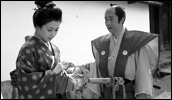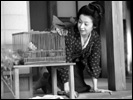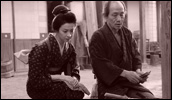Love and Honor
- Year
- 2006
- Original title
- Bushi no Ichibun
- Japanese title
- 武士の一分
- Director
- Cast
- Running time
- 121 minutes
- Published
- 21 August 2007



by Nicholas Rucka
Recently, there has been a lot of soul searching in Japan about the films that are being made - specifically the films that they don't seem to be able to put out anymore. It comes as some sort of cruel irony that the very director who spent the last 30 years of his career up until his death desperately trying to cobble together a working budget to shoot a film, is now viewed through rose-tinted glasses as the gold standard by the old guard of silver-haired men that greenlight film productions. The director I speak of is, of course, Akira Kurosawa and his single biggest crime (or so it's said) is that he made movies that spoke to an international audience - and therefore were no longer speaking to the soul of the Japanese.
But as these production company executives have aged, they are consistently confounded by the new generation of whippersnapper filmmakers who make long, drawn-out, moody jishu eiga or, at the opposite extreme, quick and vapid music video inspired action flicks. These executives long for a return to the quiet sanity of old period dramas: a more simple formula for success, if you will, because in their minds these were uniquely Japanese productions: films that were about righteous Japanese men doing noble things during Japanese history. They seem to be asking, "Who wouldn't want to spend money to go and see that?"
Yoji Yamada is one of a dying breed of old-guard directors. Having been working in films since the 1950s and directing since 1961's Shochiku production Stranger Upstairs (Nikai no Tanin), he had, until the mid-1990s, carved himself out primarily as a creative journeyman contract director. Famous for his world-record 48-feature film series Otoko wa Tsurai yo (a.k.a. the Tora-san films) he'd also filled out his formidable career with other long-running film series including, A Class to Remember (Gakko, four films) and Free and Easy (Tsuribaka Nisshi, 13 films).
Acting on a bug that was placed in his craw by the aforementioned Akira Kurosawa, Yoji Yamada collected 10 years of notes and prep and battened down the jidai geki hatches to make 2002's excellent Twilight Samurai (Tasogare Seibei). The genius of that film was that Yamada was able to find a very small, winding deer path through the wilderness of clichés and dominant genre archetypes of the jidai geki genre and somehow make something that felt revelatory and fresh. (I still remember, many years after seeing the film, Yamada's wonderful attention to fetid detail including a yard littered with sword-slain corpses buzzing with flies.) Twilight Samurai managed the difficult feat of adding a final statement to a book that was already long closed. Amazing.
However, it turns out in so far as Yamada and his silver-haired executive producing support team up on high were concerned, it was not done. What followed were two more films in, what I would call, the 'honor cycle' that Twilight Samurai kicked off, of which The Hidden Blade (a.k.a. Kakushi no Ken: Oni no Tsume) starring Masatoshi Nagase was the sequel and late 2006's Love and Honor was the conclusion.
Were these films necessary? No, not really. But walk into Japan's biggest bookstore, Sansedo, in Chiyoda Ward, head up to the film and TV section and you'll see a veritable shrine to Yoji Yamada: books upon books about him and his movies, his scripts, etc. It's amazing really. One would be forgiven for thinking that Yamada is of the same caliber as Kenji Mizoguchi or Yasujiro Ozu - if quantity were the only measure. But make no mistake: all this evidences is a concerted and well-orchestrated plan for hailing Yamada as a living legend; a call into the wilds of the film world that Japan still makes those classic samurai films of old and they're deserving of attention, and that the man who makes them is named Yoji Yamada, who should be remembered in the same breath as Akira Kurosawa or Masaki Kobayashi.
The thing is, of course he's not as good - but he can't be disregarded as bad, either.
In Love and Honor, Takuya Kimura plays Shinnojo Mimura, a lower ranking samurai in attendance to an aging lord, who is the poster-child of rich, uncaring powerful jackass. As part of Shinnojo's and his compatriot's thankless duty being low ranking samurai, they are required to test their lord's food for poison before he eats it. Shinnojo naturally has other dreams outside of this tedious existence; he wants nothing more than to open up his own kendo dojo where he will recruit students regardless of social class. But when Shinnojo falls ill from eating some bad shellfish he saves his lord's life but nearly at the expense of his own.
Fortunately, for our drama, Shinnojo survives the food poisoning but not without losing his eyesight (an ancillary effect that can occur from such a brush with death. It should be noted that it is discovered through a classic movie cliché: by holding a hand in front of Shinnojo's unblinking eyes; always a reliable indicator.) One would think that having saved his life Shinnojo's lord would confer some great honor or at the very least some sort of financial compensation for his disability. But no, he's still selfish and since a blind samurai is apparently useless, he ditches him.
Shinnojo's wife Kayo (Dan) is a loving and doting servant. Newly poor and unsure as to what the future holds, Kayo runs into an old acquaintance, Toya Shimada (Bando), who happens to have become a very powerful samurai. Shimada, it seems, still has a 'thing' for Kayo and now that he has heard of Shinnojo's shellfish mishap, he wants to help out. Kayo declines but when the rest of the Shinnojo family demonstrates a total lack of interest in aiding the couple, Kayo goes hat in hand to the Shimada's house in search of work. He hires her and, it is implied, promptly rapes her.
Defiled and wracked with guilt, Kayo confesses to Shinnojo what happened. Shinnojo blows his stack and banishes Kayo from the house. Alone with only his loyal manservant (Sasano) Shinnojo stews in the juices of his cruel fate. Out of this comes a small nagging and then, eventually, a dominating interest in picking up his sword again and practicing forms. Shinnojo starts training again and through this rediscovers his 'Bushi no Ichibun' - the warrior part - within him. Once boiling with confidence again he calls out Shimada for a final battle of honor and the rest is jidai geki cliché...
Love and Honor isn't a bad film at all, but it's not nearly as good as Twilight Samurai. Part of this has to do with what I imply at the start: that the film lacks the inventiveness of the first entry in this cycle; in short, there's an irrelevance to the film even existing. None of the issues that the film raises - corrupt officials, cruel and unusual punishment for loyalty, or a dog's life for a handicaped person - are new to the genre or handled in a particularly fresh manner. All you have to do is go back to the 1960s and quickly you'll find that there's a truck-load of films that literally channel the counter-cultural foment and radicalism of the time and funnel it through the chanbara or jidai geki formats to cloak criticism of the dominant paradigms. No, this film somehow feels like a 1950s Daiei production and most certainly not a 2006 Shochiku production. From the production values to filmmaking choices, from the script to the dramatic highlights, this is pure retro disguised as a Kinema Junpo Best of the Year film entry. But what does that really mean? It just feels like a room of old men with a hankering for the old days commissioned this film.
Let me get off of the criticism for a moment and talk about what is really good about the film: Kimura's performance. Popularly known by his nickname Kimutaku, the boy idol turned adult idol - a singer from the boys group SMAP and star of such saccharine pap as Juvenile - can deliver a magnetic performance. I was mesmerized by it and not withstanding some clichéd directing notes from Yamada re: discovering his blindness, he's someone I would love to see in another (dramatic) movie. But not to just focus on Kimura here, the other leads were also quite solid and in general hats should go off to Yamada for exercising a good control over an ensemble cast and delivering solid performances on all sides.
That said and just to beat this horse to death, the weak point is that the story is so... typical. I'm well aware that jidai geki regularly treads over the same ground (47 Ronin or Musashi Miyamoto anyone?) and how that is one of the attractive parts of the genre for some viewers. But for me this time out it's at the expense of the film - it kills it for me. I couldn't shake the feeling that if the story, and by proxy the script, were stronger, that given the casting and performances it could have been a very good movie and there would definitely be something for people to crow over Yamada for. As it is, the film feels like it's been made by a committee of old men. But what did you expect? The people that are trying to sell it to you as something new and exciting are - you guessed it! - old men. And that is the problem.